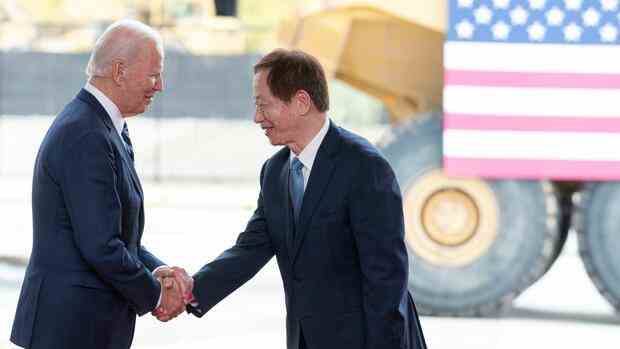Tokyo US President Joe Biden records another success of his industrial policy. TSMC, the world’s largest contract manufacturer of chips, wants to triple its investments in the US to $40 billion. The Taiwanese company announced this on Tuesday at a ceremony at the construction site of its first US chip factory in the state of Arizona.
The additional capital is to be used to set up a second state-of-the-art chip factory by 2026, which will then produce chips with three-nanometer structures. As transistors get smaller, they can do more with less power. These semiconductors are therefore particularly important for high-tech mobile devices such as smartphones.
With the announcement, Apple’s most important chip supplier is strengthening its commitment in the USA. The twelve billion dollar plant, where the construction of the first production facilities was celebrated on Tuesday, is to produce four-nanometer chips from 2024, which will be used in the latest iPhone, for example. Appropriately, tech giants such as Apple boss Tim Cook and Nvidia founder Jensen Huang were also among the guests.
US President Joe Biden swears by the success of his industrial policy
Top jobs of the day
Find the best jobs now and
be notified by email.
The Taiwanese are thus reacting to the growing pressure from the US government on domestic and foreign companies to increasingly manufacture chips and other key products such as batteries and electric cars in the US and not to export them. In a speech at the celebrations, Biden underscored the ambitions of his Chips and Science Act. The $53 billion program aims to attract chip manufacturers and keep rival China at bay.
By relocating jobs, the US share of global chip production has fallen from 30 to 10 percent, Biden explained. The country is a world leader in research and development of new chip technologies. “But where is it written that America can’t lead the world in manufacturing again?” asked the US President. “We’re proving we can.”
The US government’s $53 billion program aims to attract chip manufacturers and keep rival China at bay.
(Photo: AFP/Getty Images)
This year, Biden made it clear who he sees as opponents and allies in this project. He threatened companies that continue to supply modern chips to China with severe penalties.
Especially in export-oriented countries such as Germany, Japan and South Korea, this fuels concern that parts of the economy could decouple from their important trading partner China. At the same time, with his “Chip 4” alliance, Biden is promoting Japan, South Korea and Taiwan to cooperate more closely with the United States.
>> Read here: Europe’s chip industry sounds the alarm: “Being overtaken left and right”
The mixture of threats of punishment and financial help works. South Korea’s memory chip giant Samsung is investing 17 billion dollars in a plant in Texas, while the domestic manufacturer Intel is investing 40 billion in factories in Arizona and Ohio. Japan’s government, in turn, has agreed to develop production technology for two-nanometer chips together with the USA.
TSMC doesn’t want to be left out either, as the group obtains most of the chip design and sales from the USA. Chairman of the board Mark Liu emphasized in a press release that his company is now building the most environmentally friendly and advanced semiconductor production facility in the USA. “We are grateful for the continued collaboration that has brought us here and look forward to working with our partners in the United States to serve as a base for semiconductor innovation.”
Taiwan and the great power conflict between the USA and China
However, this confidence is not shared by everyone in Taiwan. Business and population have become accustomed to being an irreplaceable part of the global supply chain. However, this makes the country a risk from the point of view of international customers. China has repeatedly threatened to invade the island, which Beijing regards as a renegade province.
In that case, the West would lose its most important chip supplier. Europe and Japan are also luring with subsidies to attract factories from TSMC and other chip manufacturers. Tokyo has already had success: together with Sony and the automotive supplier Denso, the Taiwanese are building a plant for seven billion dollars.
TSMC founder Morris Chang had criticized this shift in production as inefficient. Because the ever smaller structures require ever larger investments in ever larger factories in order to keep unit costs low. Distributing production therefore threatens to increase chip prices for customers. In addition, there are growing concerns in Taiwan that the key industry will leave the country.
>> Read also: 70 percent price increase this year: chip suppliers Aixtron is successful in the niche
But now Chang has apparently capitulated in the face of the great power conflict. “Globalization is as good as dead, and so is free trade,” he told a news conference in Arizona on Tuesday. “A lot of people still wish for her to come back, but I don’t think she will.”
More: Lure call from America: German chemical and pharmaceutical companies are drawn to the USA
